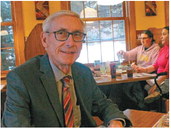State of the state


Gov. Evers looks back on tumultuous first year, looks ahead to 2020
Education, roads and healthcare — those three items were on Gov. Tony Evers...


Gov. Evers looks back on tumultuous first year, looks ahead to 2020
Education, roads and healthcare — those three items were on Gov. Tony Evers...